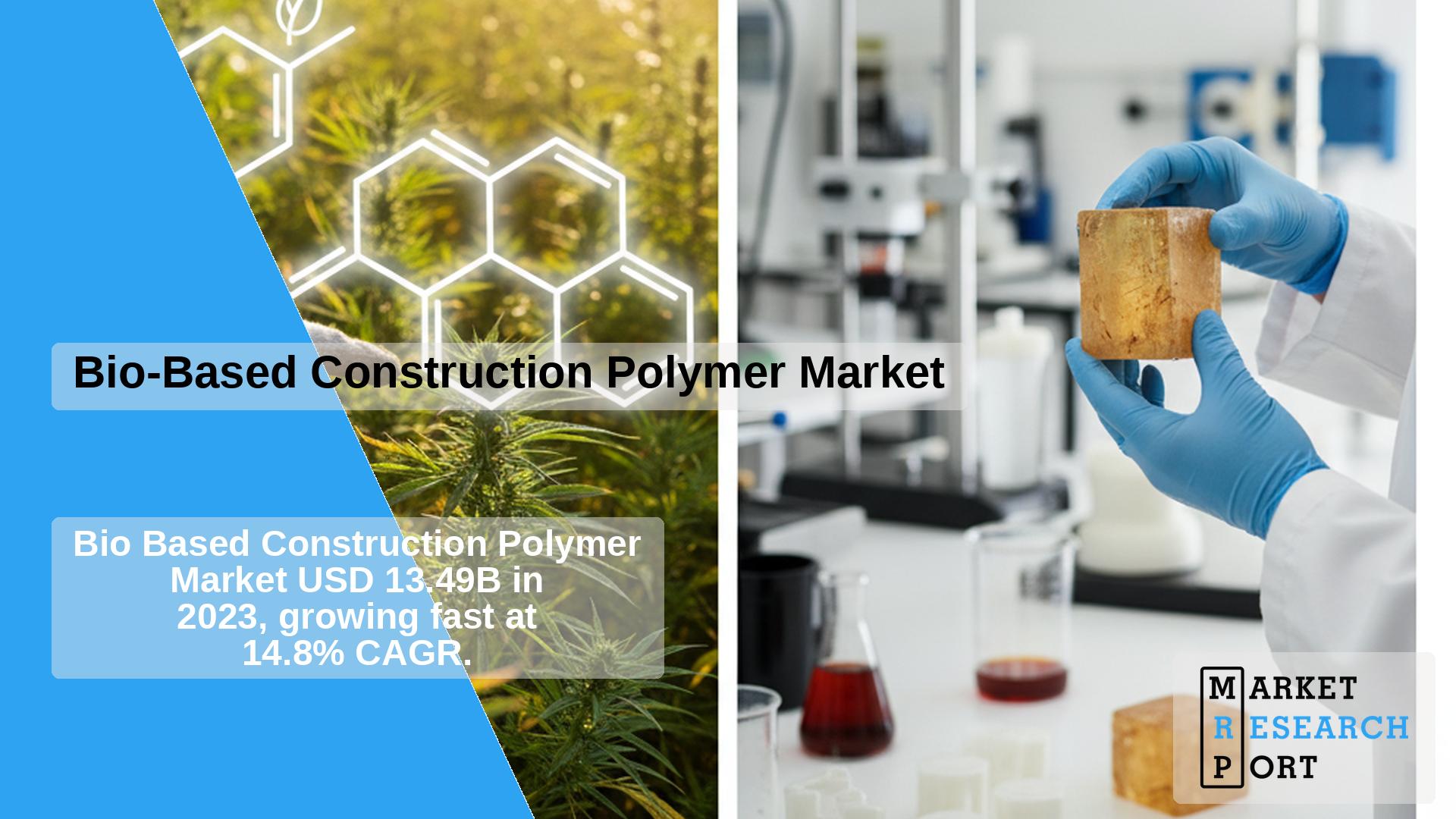
The global bio-based construction polymer market was valued at USD 13.49 billion in 2023 and is expected to grow at a CAGR of 14.8% from 2024 to 2030. Growth is credited to the strategic use of renewable raw materials such as biomass, agricultural waste, and other sustainable feedstocks. This aligns with green building trends and a rising focus on sustainability in construction.
Growing environmental awareness is a significant driver. Bio-based polymers, derived from natural sources, reduce greenhouse gas emissions compared to petroleum-based plastics, thereby decreasing the carbon footprint and helping mitigate climate change. Their biodegradability and compostability prevent the accumulation of persistent plastics in the environment.
Further, regulatory emphasis on waste reduction and certifications such as LEED are pushing the demand for bio-based construction polymers. Governments and organizations are allocating increased R&D budgets for eco-friendly innovations, driving the adoption of these polymers across the construction sector.
On the downside, high production costs and a lack of robust global supply chains remain obstacles for industry expansion, preventing economies of scale compared to traditional petroleum-based alternatives.
Polyethylene terephthalate (PET) claimed the largest market share of 49.5% in 2023, driven by unstable petroleum prices and the shift toward sustainable materials. Bio-based PET is prized for its recyclability, biodegradability, and renewable sourcing, aligning with global environmental goals.
Polyurethane (PU) is set to expand rapidly, thanks to growing demand for rigid foam materials with excellent thermal insulation, strength, and lightweight properties—making PU ideal for uses such as pipes, flooring, panels, and roofing.
Pipes were the leading application area in 2023, benefiting from bio-based polymers’ strong insulation and thermal properties. As energy conservation requirements tighten, builders are opting for bio-based solutions in pipes and panels. Utilizing renewable construction materials helps reduce carbon emissions and supports the global move towards sustainability.
Insulation is the fastest-growing segment, projected at a CAGR of 14.8%. Demand is propelled by polyurethane’s insulation capabilities, extensively used in coatings, adhesives, paints, and other building products, especially in Europe and the U.S.
Asia Pacific led with a market share of 37.7% in 2023 due to the surge in construction projects, accelerated infrastructure development, and rapid economic growth. New product launches, favorable local policies, and investment in public projects—especially in China, India, and Japan—are ongoing contributors. The increasing preference for bio-based solutions is expected to boost future growth.
China dominates the Asia Pacific bio-based construction polymer sector, spurred by advancements in biotechnology, innovation in production methods, and reduced costs. Enhanced material functionality and expanding end uses in insulation, flooring, and pipes support this leadership.
North America accounted for 22.0% of the market in 2023, supported by strong construction activity and urbanization. Regional governments actively promote sustainable practices, increasing adoption of renewable materials.
In the U.S., stringent environmental regulations, along with widespread adoption of LEED and Energy Star certifications, are driving builders and developers to opt for eco-friendly construction polymers. Collaborative efforts among industry players and research institutions further foster the market’s growth.
Europe registered a sizable market share in 2023 by championing circular economy principles, resource efficiency, and recycling. Government incentives—grants, tax breaks, and subsidies—continue to expand the reach of renewable building polymers.
Notable participants include BASF SE, Evonik Industries, Nature Works LLC, Mitsubishi Gas Chemical Company Inc., and others. The market is marked by mergers, acquisitions, and industry collaborations to enhance competitiveness and foster innovation.
| Report Attribute | Details |
| Market size value in 2024 | USD 15.43 billion |
| Revenue forecast in 2030 | USD 35.33 billion |
| Growth Rate | CAGR of 14.8% from 2024 to 2030 |
| Base year for estimation | 2023 |
| Historical data | 2018 – 2022 |
| Forecast period | 2024 – 2030 |
| Quantitative units | Volume in Kilotons, Revenue in USD million, CAGR from 2024 to 2030 |
| Report coverage | Revenue forecast, company ranking, competitive landscape, growth factors, and trends |
| Segments covered | Ingredient, function, application, region |
| Regional scope | North America, Europe, Asia Pacific, Latin America, MEA |
| Country scope | U.S., Canada, Mexico, Germany, UK, France, Italy, Spain, Russia, Denmark, Sweden, Norway, China, Japan, India, South Korea, Australia, Indonesia, Vietnam, Brazil, Argentina, Saudi Arabia, UAE, South Africa, Kuwait |
| Key companies profiled | BASF SE; Evonik Industries; Mitsubishi Gas Chemical Company Inc.; Nature Works LLC; Bio-On.it; Toyobo Co. Ltd.; DuPont; TEIJIN limited; Avient Corporation; Tate & Lyle; Hiusan Biosciences; Kaneka Corporation; SK Chemicals; BEWI; Green Dot Bioplastic; Solvay; Trinseo; World Centric.Com; Yield10 Bioscience, Inc. |
This report covers worldwide, regional, and country-level revenue trends and forecasts from 2018 to 2030, analyzing the key sub-segments within product, application, and region.